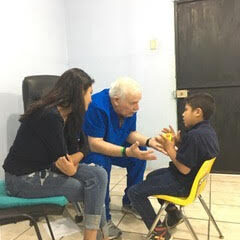Caregivers are facing unprecedented challenges during this pandemic. As the holidays approach, staying centered can be a struggle, particularly when family dynamics can be strenuous. Caregiver health should be approached with the same sense of importance as other critical issues. But if there is one bright spot in this moment, it is that people are talking about caregiving more than ever before. This is our moment for action, for advocacy, and for planning for the future.
There are many parents and grandparents who serve as the caregiver for a child or grandchild who is living with special needs, mental health issues, physical impairments, or intellectual disabilities. They love their family, but this is not what they thought their life would be. The constant strain, the immense tiredness, and the feelings of being overwhelmed can be all-consuming. Jane tells her story like this. She became the caregiver for her grandson, Donnie, when he was just five years old. Donnie does not remember his parents, Jane’s daughter and son-in-law. They abandoned Donnie when he was diagnosed with cerebral palsy. Through the years, Jane has done an exceptional job of caring for Donnie and giving him the best life, she could. Yet, she sees that she will not be able to keep up the pace, especially as Donnie grows. The sheer weight of Donnie’s body, as she lifts him into her arms to move him from one place to another throughout the day is getting too much for her frail, 87-year-old body.
Then, there is Javin. He became the guardian of his son’s 14-year-old daughter, Geneva, after his own daughter was killed in a car accident. Geneva’s life is a good one, but Javin know that Geneva’s condition of autism will not give her the opportunity to live on her own, have a career, drive a car, or care for herself as she becomes an adult.
Lastly, Patricia shares her concerns over caring for her sister, Rachel, who developed mental illness in her 30’s. Rachel does not trust anyone any longer. She is paranoid, has multiple severe health issues and has recently been diagnosed with bipolar disorder. There are times, Patricia states, that she does not think she can go on due to the insurmountable pressure put upon her in the care she provides her sister.
Each of these adults is dealing with a real-life situation that will not get any better over time. They are 100% committed to caring for their loved one, their family member. Yet, they also see their limitations. They see how, in the future, they will not be able to perform at the needed level their family member requires. What can they do?
The first step to planning for the future is for each of these people to reach out and start seeking advice, suggestions, and potential solutions. Some will need medical advice while others will need financial advice, and some will need both. There is a way for the caregivers to set aside money for their loved one, the beneficiary. This money will be used to provide care and support now and when they can no longer do all of the day-to-day tasks required. The financial way is the establishment of a third-party supplemental needs trust.
Third-party supplemental needs trusts are designed to help people of any age who are living with a physical, mental, or intellectual disability. By establishing a special needs trust, the individual deposits money into the trust, for the beneficiary’s use. This money is a gift to the beneficiary. Other family members and friends can also contribute to the beneficiary’s trust. Third-party supplemental needs trusts are an ideal estate planning vehicle whereby a grandparent, parent or other family members and friends can make financial gifts or leave an inheritance to a beneficiary. The money in the trust is exempt from being considered an asset for the individual, thus allowing the person to qualify for much-needed government benefits, the most important being Medicaid to cover healthcare needs. The money in the third-party supplemental needs trust can be used to pay for items or services the government benefits do not cover. These expenses are called supplemental needs.
The second step is to choose a financial trustee to manage the trust. There are many trust companies that are legal entities working as a fiduciary, agent, or trustee on behalf of a person living with a physical, mental, or intellectual disability. These companies perform management and administration of various types of trusts. When there is a need for a trustee, choose wisely. The trust company will help the beneficiary live a good quality of life and provide the family with peace of mind.
I invite you to join me in recognizing, celebrating, and thanking the caregivers in our lives. Their compassion and dedication are a source of inspiration.
Darlene A. Kemp, MPH, MBA, Vista Points Special Needs Trusts, www.vistapoints.org














